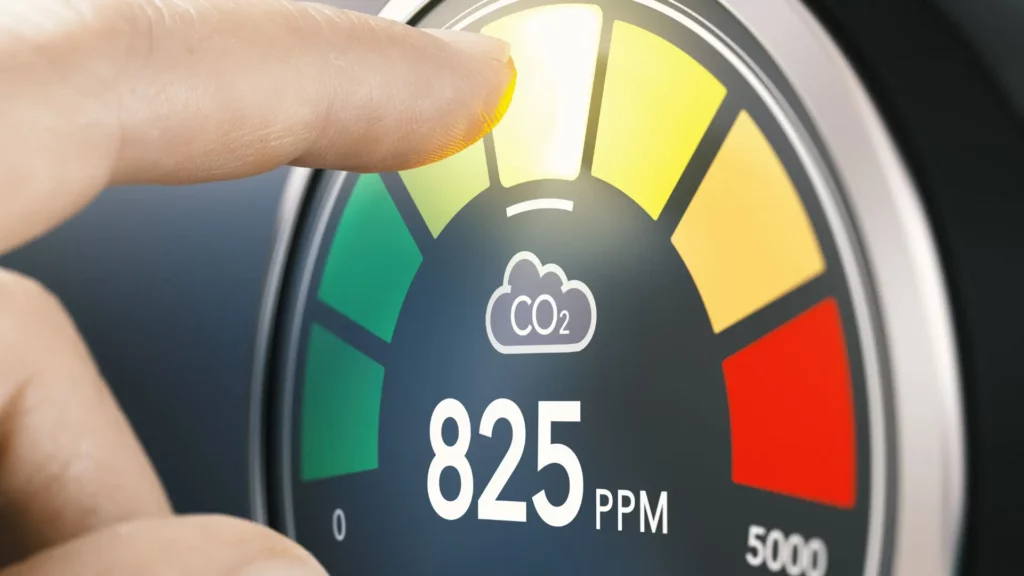The health impact of indoor CO2
As more people live in urban areas and spend over 90% of their time indoors. This makes indoor air quality a critical factor in our health and comfort. Acarbon dioxide (CO2) levels often go unnoticed but play a crucial role in creating a comfortable and healthy living environment. High CO2 levels, often the result of poor ventilation and high indoor activity, can silently affect our physical health, cognitive function, and overall well-being. Here, we explore the effects of indoor CO2, why it matters, and how to manage it effectively.

Understanding indoor CO2 and optimal Levels
Carbon dioxide is a naturally occurring gas produced by human activities such as breathing, cooking, and heating. Outdoor CO2 levels typically average around 400 parts per million (ppm), but indoor levels can rise much higher due to confined spaces and insufficient air exchange. Concentrations exceeding 1,000 ppm, as recommended by the American Society of Heating, Refrigerating, and Air-Conditioning Engineers (ASHRAE), can begin to impact health and productivity, while levels above 2,000 ppm can lead to more serious symptoms.
Interestingly, even relatively moderate increases in CO2 can have subtle yet significant effects, such as impaired cognitive performance and disrupted sleep. A 2023 study highlighted that high CO2 levels in bedrooms cause restless sleep, frequent awakenings, and earlier wake-ups, emphasizing the need for proper ventilation, especially in sleeping areas.
Effects of high indoor CO2 levels
While CO2 itself is non-toxic at typical indoor concentrations, it can indirectly harm health by displacing oxygen in enclosed spaces. The resulting effects vary based on the level of exposure:
- Mild symptoms: Elevated CO2 levels can cause fatigue, drowsiness, and reduced ability to concentrate due to lower oxygen availability.
- Cognitive decline: Studies show that as CO2 rises, problem-solving abilities, memory, and decision-making are affected, impacting productivity in offices, classrooms, and other environments.
- Severe symptoms: Levels above 2,000 ppm may lead to headaches, dizziness, and shortness of breath. In extreme cases (above 5,000 ppm), CO2 exposure can result in confusion, nausea, and unconsciousness, although such levels are rare in typical indoor environments.
High CO2 levels don’t just affect physical health—they also have a measurable impact on mental wellbeing. Poor air quality can lead to reduced productivity and fatigue, while in extreme cases, the health risks can be severe.
Managing indoor CO2 levels
Controlling CO2 levels requires effective ventilation and monitoring. Here are several strategies for maintaining optimal indoor CO2 concentrations:
- Improve ventilation: Ensuring consistent airflow is the most effective way to prevent CO2 buildup. Open windows when possible or install mechanical ventilation systems to bring fresh air inside.
- Monitor indoor air quality: CO2 sensors provide real-time data, helping identify when levels are rising and adjustments are needed.
- Avoid overcrowding: Limit occupancy in confined spaces and spread out activities to reduce CO2 accumulation.
- Smart home technology: Integrated solutions like Propflo’s HomeHub allow homeowners to track indoor CO2 and take automated steps to enhance air quality.
Seasonal adjustments
CO2 levels can vary with seasonal changes in home usage. During colder months, windows are often closed to retain heat, leading to a greater risk of CO2 buildup. Balancing ventilation with insulation is crucial to maintaining healthy indoor air quality during these periods.
With Propflo’s HomeHub, homeowners can monitor indoor CO2 levels and other environmental metrics in real-time. Our data-driven approach helps identify air quality issues early and implement effective solutions, ensuring a healthier indoor environment.
Ready to improve your home's health?
About Propflo
Propflo is an award winning data-driven AI platform that supports lenders and property businesses to comply with energy efficiency regulations, meet their climate targets, and then support their customers in their wider ownership journey.
Propflo was founded by proptech entrepreneur Luke Loveridge and geospatial and risk data scientist Dr Daniel Moyo. It also has world leading AI expert Mike Tipping as an advisor.
www.linkedin.com/company/propflo
Contacts:
Felix Schraff
comms@propflo.co.uk
Press kit



